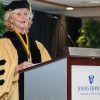Editor’s Note: The following edited speech was given by Allyson Handley, above, a graduate of the school’s inaugural Doctor of Education program in 1978, at Destination Graduation in Las Vegas on June 10.
Your degree has been conducted with the advanced technological enhancements of distance education, a format passionately embraced by the School of Education faculty who have guided your academic careers. You might be amused to learn about the “technological enhancements” that Hopkins attempted with the very first cohort of seven doctoral students in the mid-seventies. Faculty from the Applied Physics Lab were excited to meet with us during one of our first doctoral seminars as a new cohort in a brand new doctoral program. Their enthusiasm for helping us was evident. However, when it quickly became clear that they wanted to teach us all to become computer programmers, we spontaneously rebelled as a group with a resounding “No, thanks!”
Back then, and I know I am sounding ancient right now, mastering computer programming languages was an arduous and time-consuming enterprise. Can you imagine adding that requirement to the course, internship, research and dissertation requirements for a doctoral or master’s degree?
I owe profound gratitude to the founding faculty who developed the doctoral degree in education at Hopkins in the mid-1970’s: Dr. Paul Daniels, my major professor and chair of my dissertation committee, and Dr. Gilbert Schiffman, chair of the doctoral education program. I wish you could have met them both since they were such passionate advocates for the transformative power of education on individual lives. I can also thank Paul and Gil for negotiating with other Johns Hopkins faculty and administrators for a replacement of the then-university requirement that all doctoral candidates possess professional fluency in one or two foreign languages, usually French and German. Instead, we took advanced statistical analysis and research methods. What a relief to master statistics rather than advanced French and German. Who knows how long it would have taken me to finish my own doctorate if the language requirement was required?
Now that I have shared a little bit of School of Education history, let me turn to my excitement for you as you embark upon this new chapter in your lives as a member of a small and prestigious group of Hopkins graduates. I had no idea in May 1978 what tremendous opportunities would open up in my professional and personal life as a result of my doctoral degree from Johns Hopkins. You have no idea what lies ahead for you as a result of your commitment to the completion of this significant degree.
One of my favorite quotes is by Hellen Keller: No pessimist ever discovered the secrets of the stars, or sailed to an uncharted land, or opened a new heaven to the human spirit.
So even though I may not have met you yet, I know that you are by personality and character an optimist as described by Helen Keller. Your optimism is reflected in your pursuit of this hard-earned doctoral degree. You reflect the core value that is the cornerstone of Johns Hopkins University: make the world a better place for all.
During your Hopkins studies, you have learned three critical things: the value of persistence; the impact of knowledge and expertise, and the confidence to be a leader. Persistence involves choices and sacrifices and the ability to delay gratification during the marathon push to complete your research and dissertation. Your persistence serves as a role model for your children, families, friends and colleagues. In 1978, I dedicated my dissertation to my daughter Vanessa who between the ages of 3 and 5 had to eat a lot of peanut butter sandwiches made by a distracted mother writing a dissertation. Little did I know then that Vanessa would one day complete her own doctoral degree in molecular plant genetics at the University of California, Berkeley.
Second, you have learned about the impact of knowledge and expertise. Guided and supported by outstanding Hopkins faculty and recognized for your scholarly accomplishments, you now are charged with using that knowledge and expertise to indeed make the world a better place. Your paths of community and world influence will be different, but you are united by a common belief in your individual and collective potential to use the knowledge and understanding that you gained while at Hopkins to positively impact society.
Most important, with the imprimatur of a Hopkins degree, you have the confidence to be a leader and to continue to embody a life of continuous lifelong learning. Today, the Johns Hopkins School of Education and the university charge you to begin or to continue your leadership responsibilities armed with the knowledge that you can and will make the world a better place.
In closing, I am reminded of another favorite quote by an anonymous author: The future lies before us, like a sheet of driven snow, be careful how you step into it for every step will show.
We all look forward to the footsteps that you each are going to leave in the snow or, since we are in Las Vegas, in the sand. Stay in touch with your faculty and friends at the School of Education. I invite you to become active with the Johns Hopkins Alumni Association. With 212,000 alumni members worldwide, your alumni association has 70 communities worldwide participating in almost 400 annual events each year in 17 countries.
Congratulations and I hope our paths, and maybe even our footsteps, will cross in the future.

